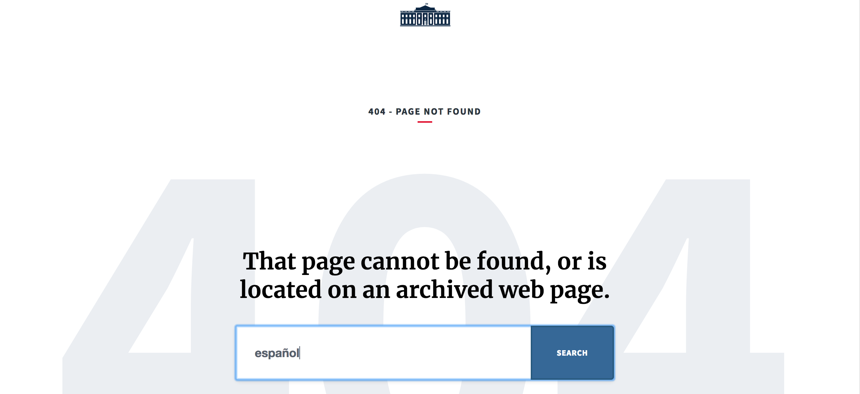
The White House's Spanish Language Site Is Still Missing
The Trump administration has not made good on its promise to provide information en español.
One in seven Americans speak Spanish at home. Zero White House websites offer information in that language.
At the beginning of Donald Trump’s presidency, the White House removed all Spanish-language content from its website. The site that used to live at whitehouse.gov/espanol, started under Barack Obama in 2009, disappeared. Now even the error message on that page is in English.
At first, it seemed like this might just be part of a generally bumpy presidential transition. There were a lot of other things missing from the new White House website, too. Sean Spicer, the press secretary at the time, promised in January 2017 that coders were “working overtime” to get the Spanish-language site back up. Later, in July, the White House’s director of media affairs, Helen Aguirre Ferre, said the site would be launched by the end of 2017.
Well into February, with the State of the Union in the rear-view mirror, there is still no Spanish information on the White House website. And now Ferre “declines to say whether there are still plans to have a Spanish-language website,” according to the AP.
It’s not surprising that providing information in Spanish is not a priority for a Trump administration. The president does not really believe that languages other than English belong in the United States. During the 2016 primaries, he complained about Jeb Bush speaking “Mexican,” because “this is America.” Even Trump’s favorite social media platform is largely neglected: The White House does have a Spanish-language Twitter feed, @LaCasaBlanca, but it is rarely updated.
I know what you’re saying: “I never check the English-language White House website for anything, in fact I don’t know if I’ve ever even looked at it, so does it really matter that there is no Spanish version?” Let’s just say that Spanish speakers might be interested in knowing exactly what the official line is on, for example, “chain migration.” This is the administration’s term for the long-standing American practice of immigrants bringing family members to live with them in the United States, and is Trump’s latest immigration bugbear.
Spanish speakers in the US, even if they were born there and are full-blown citizens, need to know that the White House thinks that family ties should no longer be a factor in immigration decisions. They need to be able to share Trump’s views with people they know who might be affected. Call it chain migration of information. That chain can’t spread through the Spanish-speaking community if it’s not available in the first place.
And if Trump really “loves Hispanics”—as he proclaimed while eating a taco salad—and thinks his policies will help them, why not say so in the language they understand best?






